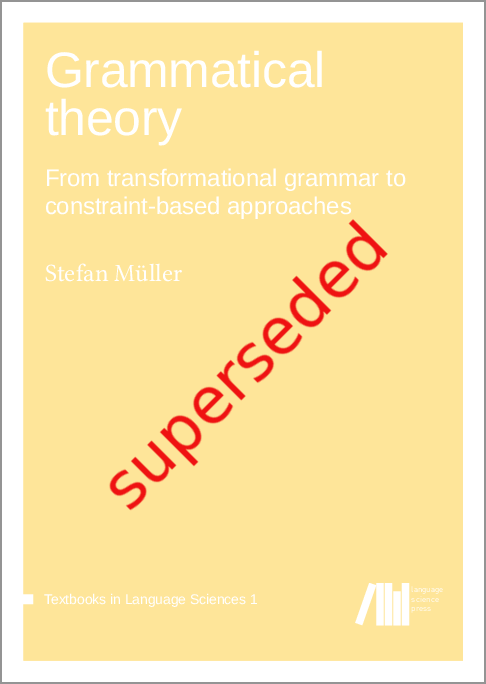We log anonymous usage statistics. Please read the privacy information for details.
Superseded: Grammatical theory: From transformational grammar to constraint-based approaches
Synopsis
This book is superseded by the third edition, available at http://langsci-press.org/catalog/book/255.
This book introduces formal grammar theories that play a role in current linguistic theorizing (Phrase Structure Grammar, Transformational Grammar/Government & Binding, Generalized Phrase Structure Grammar, Lexical Functional Grammar, Categorial Grammar, Head-Driven Phrase Structure Grammar, Construction Grammar, Tree Adjoining Grammar). The key assumptions are explained and it is shown how the respective theory treats arguments and adjuncts, the active/passive alternation, local reorderings, verb placement, and fronting of constituents over long distances. The analyses are explained with German as the object language.
The second part of the book compares these approaches with respect to their predictions regarding language acquisition and psycholinguistic plausibility. The nativism hypothesis, which assumes that humans posses genetically determined innate language-specific knowledge, is critically examined and alternative models of language acquisition are discussed. The second part then addresses controversial issues of current theory building such as the question of flat or binary branching structures being more appropriate, the question whether constructions should be treated on the phrasal or the lexical level, and the question whether abstract, non-visible entities should play a role in syntactic analyses. It is shown that the analyses suggested in the respective frameworks are often translatable into each other. The book closes with a chapter showing how properties common to all languages or to certain classes of languages can be captured.
The book is a translation of the German book Grammatiktheorie, which was published by Stauffenburg in 2010. The following quotes are taken from reviews:
With this critical yet fair reflection on various grammatical theories, Müller fills what was a major gap in the literature. Karen Lehmann, Zeitschrift für Rezensionen zur germanistischen Sprachwissenschaft, 2012
Stefan Müller’s recent introductory textbook, Grammatiktheorie, is an astonishingly comprehensive and insightful survey for beginning students of the present state of syntactic theory. Wolfgang Sternefeld und Frank Richter, Zeitschrift für Sprachwissenschaft, 2012
This is the kind of work that has been sought after for a while [...] The impartial and objective discussion offered by the author is particularly refreshing. Werner Abraham, Germanistik, 2012
Reviews
-
Review of Grammatical theory: From transformational grammar to constraint-based approaches, volumes 1 and 2, 2016
by Michael T. Putnam
published August 18, 2017
... These two volumes represent one of the first attempts since Sells’ (1985) seminal work to provide theoretical linguists and those who work closely with them with an overview of the general representational machinery of contemporary frameworks and the key issues that separate those who prefer one over another. In general, the presentation of empirical data and theoretical concepts is highly accessible to scholar and student alike. The best use of these materials is for those seeking to gain a better understanding of the core concepts that motivate the general representations present in these frameworks. Although there are traits that are shared across many of these covered here, there are also fundamental differences that persist. These volumes at the very least enable those with different perspectives on key issues to engage in discussions and perhaps gain a better understanding and appreciation of each other’s research moving forward. ...




